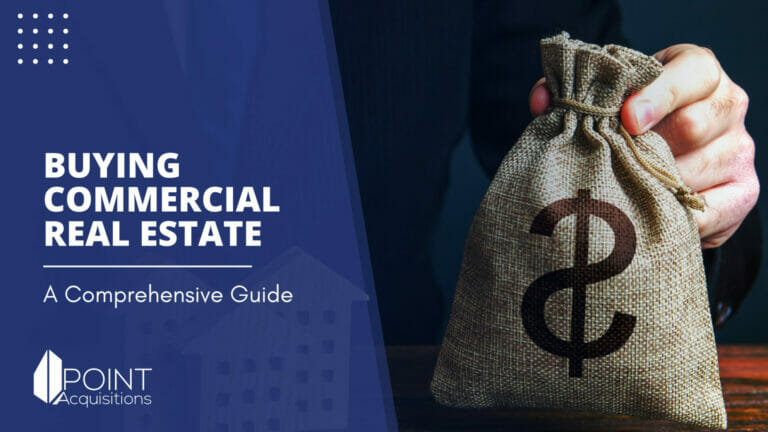
How to Buy Commercial Real Estate
Commercial real estate is a booming industry and for a good reason! It can be a very lucrative investment. However, if you’re new to the world of commercial real estate, it can be confusing to know where to start.
To buy commercial real estate effectively involves a series of strategic steps designed to maximize investment potential while minimizing risk. To start, you must understanding what constitutes commercial real estate. This category encompasses properties used for business purposes, including retail spaces, offices, warehouses, apartments, and more, each offering different benefits such as revenue generation through rent or business operations.
The process of buying commercial real estate starts with setting a clear budget, taking into account not just the purchase price but also additional expenses like taxes, maintenance, and any needed renovations. Following this, thorough market research is important to identify promising locations and property types, considering items such as local economic health, demand for space, and future development plans.
Engaging with a real estate professional can provide invaluable guidance through the search, offering insight into market trends and helping to deal with negotiations and legal requirements. Financing is the next step, with options ranging from traditional loans to more specialized commercial lending products; understanding the terms and securing the best rates are important to a successful investment. Finally, making an offer and proceeding to closing involves detailed due diligence, including property inspections, appraisal, and review of financials, to be sure of the investment’s soundness.
Each step in the process, from initial budgeting to finalizing the purchase, requires careful consideration and planning. With the right approach and professional guidance, investing in commercial real estate can be a profitable venture that contributes to an investor’s financial growth and portfolio diversification.
In this guide, we will teach you everything you need to know on how to buy commercial real estate. We’ll deliver facts about the industry, explain the basics of commercial real estate investing, and walk you through the essential steps on how to purchase a commercial property. If you’re ready to start investing in commercial real estate, then this guide is for you!
Table of Contents
What is Commercial Real Estate?
Commercial real estate investing can be a great way to build wealth. But what exactly is commercial real estate? It’s a type of property that is used for business purposes. It can include retail stores, restaurants, warehouses, and more. There are many different uses for these properties and they can generate revenue in multiple ways. The usage of buildings for commercial purposes has a significant impact on the finance and taxation of the building and specific rules on the property.
Likewise, commercial properties include shopping centers, retail space, manufacturing stores, and more. Their performance is usually determined by business activity across a region or economy.
Purchasing commercial real estate will offer you a variety of features and amenities that are beneficial for businesses. These include ample parking spaces, large spaces that can be divided into multiple rooms or offices, and high-traffic locations. This is a massive opportunity for commercial real estate investors to have their money work for them.

Why Invest in Commercial Real Estate?
There are different reasons why investors may want to consider investing in commercial real estate. Here are some of the most common reasons:
Higher ROI than Residential Properties
A commercial real estate property typically offers higher returns than residential properties when it comes to investment opportunities. This is due to many factors, such as the increased demand for commercial space and the fact that businesses are less likely to default on their leases than individuals. In addition, commercial property is often appreciated at a faster rate than residential properties, providing investors with the potential for significant capital gains. As a result, commercial real estate can be an attractive option for those looking to generate above-average returns on their investment.
Less risky than Single-Family Homes
When considering a commercial property investment, it is essential to assess the risks involved. Generally speaking, getting a commercial property is less risky than single-family homes. This is because they are typically larger and have more diverse tenant profiles. As a result, they can weather economic downturns, and vacancy rates tend to be lower. Additionally, a commercial property often generates higher returns than residential properties, making them a more attractive investment for many investors. Keep in mind that every investment carries some risk; nevertheless, commercial real estate tends to be a relatively safe bet.
Diversify Your Investment Portfolio
You can add stability to your portfolio by investing in commercial property and potentially earn higher returns than you would from traditional investments such as stocks and bonds. Commercial real estate can also provide a hedge against inflation, as property values tend to increase faster than the overall cost of living. And, because commercial property is used for business operations, it can offer certain tax advantages, such as being able to deduct depreciation expenses. If you’re looking for a unique way to diversify your portfolio and potentially boost your returns, commercial real estate may be worth considering.
Investing in real estate is an outstanding idea for any business owner. The equity you build from investing can allow your company to grow and save money in terms of their current rental agreement, which could be up to ten or fifteen percent.
Types of Commercial Real Estate Properties
There are many different kinds of commercial properties for real estate investing, each with its own set of benefits and drawbacks. Here are some of the most common types:
Office Buildings
Office buildings are an excellent choice for businesses that need a lot of space. They come in all shapes and sizes, making it easy to find one that fits your needs. They also offer a wide range of features and amenities, such as conference rooms, shared reception areas, and kitchenettes. And because they’re typically located in high-traffic areas, office buildings are an excellent choice for businesses that want to be seen by potential customers.
Industrial Properties
Industrial properties are perfect for businesses that need lots of space or have heavy manufacturing or processing operations. They come in various sizes and can be used for a wide range of purposes, including manufacturing, warehousing, and distribution. Industrial properties are also often located in strategic locations near highways and other transportation hubs.
Retail Properties
Retail properties are perfect for businesses that need to sell products or services to the public. Retail properties also offer a wide range of features and amenities, such as signage, parking spaces, and display windows. And because they’re typically located in high-traffic areas, retail properties are an excellent choice for businesses that want to be seen by potential customers.
Mixed-Use Properties
Mixed-use properties are perfect for businesses that want to live and work in the exact location. Mixed-use properties offer a wide range of features and amenities, such as office space, retail space, and residential units.
Hospitality Properties
Hospitality properties are perfect for businesses or individuals that need a place to stay when traveling for work or leisure. Hospitality properties, such as hotels, motels, and hostels, offer many features and amenities, such as conference rooms, meeting spaces, and on-site restaurants.

How to Buy a Commercial Property
Buying commercial property is a good investment and is often more attractive than certain types of residential properties. But even for experienced property investors, this can be difficult because purchasing property is not the same process as purchasing homes.
Now that you know more about the real estate industry let’s go over the essential steps of buying commercial real estate to find the right property. Here are the steps you need to take as a commercial real estate investor:
Step One: Figure Out Your Budget
Before buying commercial properties, you need to figure out how much money you have available for investment. Keep in mind that commercial real estate loans are generally more expensive than residential property. With that being said, you’ll need to have a larger budget if you want to purchase a commercial building.
Step Two: Research the Market
Once you know how much money you can spend, it’s time to start doing your research and find your commercial property type. You need to figure out which market areas are best for a good investment and explore all the potential properties. Are you looking for office space in a downtown area? Or maybe you’re interested in purchasing a retail store on a busy street corner? It’s essential to do proper research and find the right investment options to meet your current needs.
Step Three: Contact a Realtor
Now that you’ve done your research, it’s time to contact realtors. A good realtor will surely help you find the best properties in the market and guide you through the commercial real estate purchase. Don’t be afraid to ask for referrals from friends and family members who have purchased commercial real estate in the past.
In the same way, a commercial real estate attorney will be able to provide you with the best legal advice for your purchase. You don’t want to cut any corners when purchasing a commercial property—having a good team of professionals by your side will help ensure a smooth process.
Step Four: Get Your Financing in Order
Once you’ve found the perfect property, it’s time to start arranging your financing options. This can be difficult, as most banks are not familiar with lending money for commercial real estate investments. It’s essential to shop around and find the right lender who will give you the best terms possible so that you can initiate the real estate investment.
Step Four: Make an Offer
Once you’ve found a property you’re interested in, it’s time to make an offer. Keep in mind that commercial real estate transactions can take longer than residential deals, so be prepared to wait a few weeks for a response. If the seller accepts your offer, then congratulations! You’ve just bought yourself a piece of commercial real estate. If they reject your offer, don’t worry – there are plenty of other properties out there waiting for you.
Step 5: Closing the Deal
When it comes to closing the commercial real estate deal, the paperwork needs to be in order, and all the details need to be finalized. This is where your realtor and attorney will come in handy. They will ensure that everything goes smoothly and that you’re getting the best deal possible with an investment strategy.
Differences Between Commercial and Residential Properties
There are two main options when it comes to real estate investing: commercial and residential properties. Commercial real estate generally refers to office buildings, retail centers, warehouses, and other properties used for business purposes. On the other hand, the residential real estate encompasses apartments, single-family homes, and other properties used for living quarters.
Now that you know how to purchase a commercial real estate property let’s look at the differences between commercial and residential properties.
- Commercial real estate is typically larger than residential properties.
- Commercial properties offer more amenities than residential real estate.
- Commercial real estate is often in high demand, so it tends to be easier to rent out and has a lower vacancy rate than residential properties.
- Commercial property values tend to increase at a slower rate than residential property values.
Both types of real estate can offer a healthy return on investment. Still, commercial properties tend to provide higher returns than residential ones. There are several reasons for this.
- First, commercial leases are generally longer than residential leases, providing a steadier income stream.
- Second, commercial tenants are typically large businesses that can afford higher rents than individual renters.
- Finally, commercial properties are often located in prime areas with high foot traffic. In contrast, residential properties can be located in urban downtown locations as well as more tertiary locations.
The Outcome
Now that you know the basics of buying commercial real estate, it’s time to get out there and start looking for your perfect property. With the help of a good realtor and a team of professionals, you’ll be able to develop an investment strategy that will offer you years of income and appreciation. Your future in commerical real estate is looking brighter already!
Thank you for reading! We hope this article helped explain. We would be happy to help you get started on your commercial investment journey with everything you should know about commercial real estate investment! Please keep exploring our website or get in touch with us for more information.
About The Author

Jesse Shemesh
Disclaimer
Please note that Point Acquisitions is not a tax expert or tax advisor. The information on our blogs and pages is for general informational purposes only and should not be relied upon as legal, tax, or accounting advice. Any information provided does not constitute professional advice or create an attorney-client or any other professional relationship. We recommend that you consult with your tax advisor or seek professional advice before making any decisions based on the information provided on our blogs and pages. Point Acquisitions is not responsible for any actions taken based on the information provided on our blogs and pages.
1031 Exchange Capital Gains Tax Deferral
According to a 2021 report by the National Real Estate Exchange Services (RES), over 240,000 1031 exchange transactions were completed in the United States, totaling $100 billion. This impressive figure underscores the role of 1031 exchanges in the real estate…
Read More1031 Exchange Benefits
As of Q4 2023, the national vacancy rate for all commercial property types in the United States sat at 9.2%, according to CBRE’s latest insights and research. This represents a slight decrease compared to the previous quarter and suggests a…
Read More1031 Exchange Legal Considerations: A Must-Read Guide
You’re in the right place if you’re considering a 1031 exchange for your commercial real estate investments. Whether you’re a seasoned investor or just dipping your toes into the market, understanding the legal landscape of 1031 exchanges is key to…
Read More

